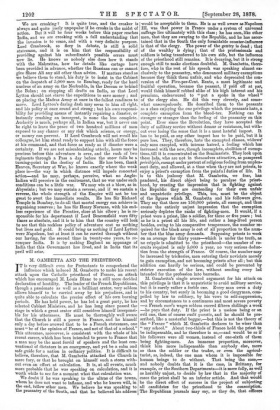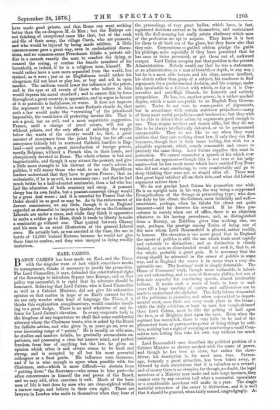M. GAMBETTA AND THE PRIESTHOOD.
IT is very difficult even for Protestants to comprehend the influence which induced M. Gambetta to make his recent attack upon the Catholic priesthood of France, an attack which has encouraged M. Louis Blanc to a still more decided declaration of hostility. The leader of the French Republicans, though a passionate as well as a brilliant orator, very seldom allows himself to be carried away by his prejudices, and is quite able to calculate the precise effect of his own burning periods. He has held power, he has led a great party, he has selected Cabinet Ministers, and he has long since passed the stage in which a great orator still considers himself irresponsi- ble for his utterances. He must be thoroughly well aware that the Church is still a power in France, and he himself only a day before avowed that to be a French statesman, one must "be of the opinion of France, and not of that of a school." This utterance, moreover, is consistent with the whole of his recent career, which has been intended to prove to France that a man may be the most fervid of speakers and the least con- ventional of dictators in an emergency, and yet be a calm and safe guide for a nation in ordinary politics. It is difficult to believe, therefore, that M. Gambetta attacked the Church in mere fury, or that he brought on himself such a storm with- out even an effort at calculation. It is, at all events, much more probable that he was speaking on calculation, and it is worth while to see for a moment what that calculation was.
We doubt if he was speaking to the ultras of the towns, whom he does not want to inflame, and who he knows will, in the end, follow other men. We believe he was speaking to the peasantry of the South, and that he believed his address- would be acceptable to them. He is as well aware as Napoleon HI. was that power in France under a system of universal suffrage lies ultimately with this class ; he has seen, like other men, that they are swaying to the Republic, and he has ascer- tained that in the South the only formidable counter-influence is that of the clergy. The power of the gentry is dead ; that of the wealthy is dying ; that of the professionals and soldiers is being transferred to his own side, but the influence of the priesthood still remains. It is decaying, but it is strong enough still to make elections doubtful. M. Gambetta, there- fore, who in the rest of his speech was speaking almost ex- clusively to the peasantry, who denounced military exemptions because they think them unfair, and who deprecated the con- version of the Five-per-Cent. Bente, a most legitimate and fruitful operation, because the peasant, if paid off at par, would think himself robbed alike of his high interest and his premium, endeavoured to "put a spoke in the wheel "- of the clergy also. He did this very cleverly, and some- what unscrupulously. He described them to the peasants as a class enjoying the one privilege which the peasants hate, a complete exemption from the blood-tax. Nothing can be stronger or stranger than the feeling of the peasantry on this point. Ever since the Revolution, they have accepted the duty of military service without demur or resistance, but with- out ever losing the sense that it is a most hateful impost. It has to be paid, as any other impost has to be paid, but it is pure loss. They, therefore, hate the exempted classes, widows' only sons excepted, with intense hatred, a feeling which has increased with the new, though incomplete, abolition of exemp- tions,till it is concentrated on the Seminarists. They look upon these lads, who are not in themselves attractive, as pampered. privile'gie's, exempt under pretext of religious feeling from unplea- sant duty, and allowed, at a time when they are not priests, to enjoy a priest's exemption from the painful duties of life. It is to this jealousy that M. Gambetta, we fear, has pandered, his direct object being to paralyse the priest- hood, by creating the impression that in fighting against the Republic they are contending for their own unfair and unpatriotic privilege. This, too, must be the object of the figures which M. Gambetta and his followers give. They say that there are 150,000 priests, all exempt, and thus. create the entirely unjust impression that the exemption seriously depletes the ranks of fighting-men. It would, if a priest were a priest, like a soldier, for three or five years ; but as he is a priest all his life, and rather a long-lived person besides, owing to his comparative temperance, the number re- quired for the black army is out of all proportion to the num- ber that the blue army demands. Supposing priests to work on an average for thirty years—which is under the truth, as no cripple is admitted to the priesthood—the number of re- cruits required is only 5,000 a year, no very serious deduc- tion from the strength of France. Of course, the number may be increased by trickeries, men entering their noviciate merely to gain exemption, and not becoming priests after all ; but this addition can hardly be serious, and could be prevented by stricter execution of the law, without sending every lad intended for the profession into barracks. M. Gambetta's single avowed argument for his attack on this privilege is that it is unpatriotic to avoid military service, but it is surely rather a feeble one. Every man owes a duty to his country, but surely in becoming a good clergyman, com- pelled by law to celibacy, by his vows to self-suppression,. and by circumstances to a continuous and most severe poverty —a French cures wages seldom exceed fifteen shillings a week —he pays that duty. If the priest is a useless being or an evil one, then of course cadit qucestio, and he should be pro- scribed, like a masterful beggar,—but this is not the theory of the " France " which M. Gambetta declares to be wiser than "any school." About two-thirds of France hold the priest to be indispensable, and he therefore is so,—and would be so if his followers were all women, instead of one-sixth of them being fighting-men. An immense proportion, moreover, think him more indispensable than anybody else, more so than the soldier or the trader, or even the agricul- turist, as, indeed, the one man whom it is impossible for human beings to do without. That being the cases— and nobody doubts that it is the case, in Brittany, for example, or the Southern Departments—it is mere folly, as well as horribly unjust, to decide by law that in the majority of cases the priest shall be an inferior article. And that would be the direct effect of success in the project of subjecting all candidates for the priesthood to the conscription. The Republican journals may say, as they do, that officers have made good priests, and that Borne can want nothing better than the ex-dragoon M. de Mun ; but the Bishops are not thinking of exceptional cases like that, but of the rank and file of their army, the village Cures, who are peasants, and who would be injured by being made soldiers. A little Common-sense goes a great way, even in ecclesiastical discus- sions, and no common-sense Frenchman thinks a private sol- dier in a cassock exactly the man to comfort the dying, or counsel the erring, or confess the female members of his household, or indeed, if he is a religious man, himself. He would rather have a man more separated from the world, less stained, as it were; • just as an Englishman would rather his clergyman did not hunt or play loo, or buy and sell in open market. The uniform would lower the influence of the priest, and in the eyes at all events of those who believe in him would depress his moral standard ; and to ensure this by force throughout a great country, is oppression, and to argue in favour of it as patriotic is foolishness, or worse. It does not improve the argument if we believe, as some Radicals clearly do, that such a law would make the " recruiting " of the priesthood impossible the candidates all preferring secular life. That is not a good, but an evil, and a most unpatriotic suggestion. France, until a change of creed occurs, will not go without priests, and the only effect of reducing the supply below the wants of the country would be, first, a great amount of annoyance from the priest living too far off—an annoyance bitterly felt in scattered Catholic families in Eng- land—and secondly, a great introduction of foreign priests, mostly Belgians, without a French idea in their heads, and obsequiously devoted to Rome. The whole scheme is bad and impracticable, and though it may attract the peasant, and give a little more strength to his distrust of the cure's advice in politics, it will annoy those who wish to see the Republican leaders understand that they have to govern France ; that an ecclesiastic, if he is an evil, is a necessary one ; and that he had much better be a half-educated seminarist, than a lad who has had the education of both seminary and camp. A peasant clergy has its own faults, but a peasant-conscript clergy would be a great deal worse ; and it is essential for France that the Order should be as good as may be. As to the enforcement of devout consciences, we say little, though it is in England regarded as shameful to impress a Quaker, for on the Continent Liberals are under a craze, and while they think it oppressive to make a soldier go to Mass, think it tends to liberty to make a seminarist go without one. That quarrel between Chanzy and his men is an exact illustration of the general Liberal error. He actually lost, as was asserted at the time, the use in battle of 15,000 trained Bretons, because he would not give them time to confess, and they were unequal to dying readily unshriven.































 Previous page
Previous page